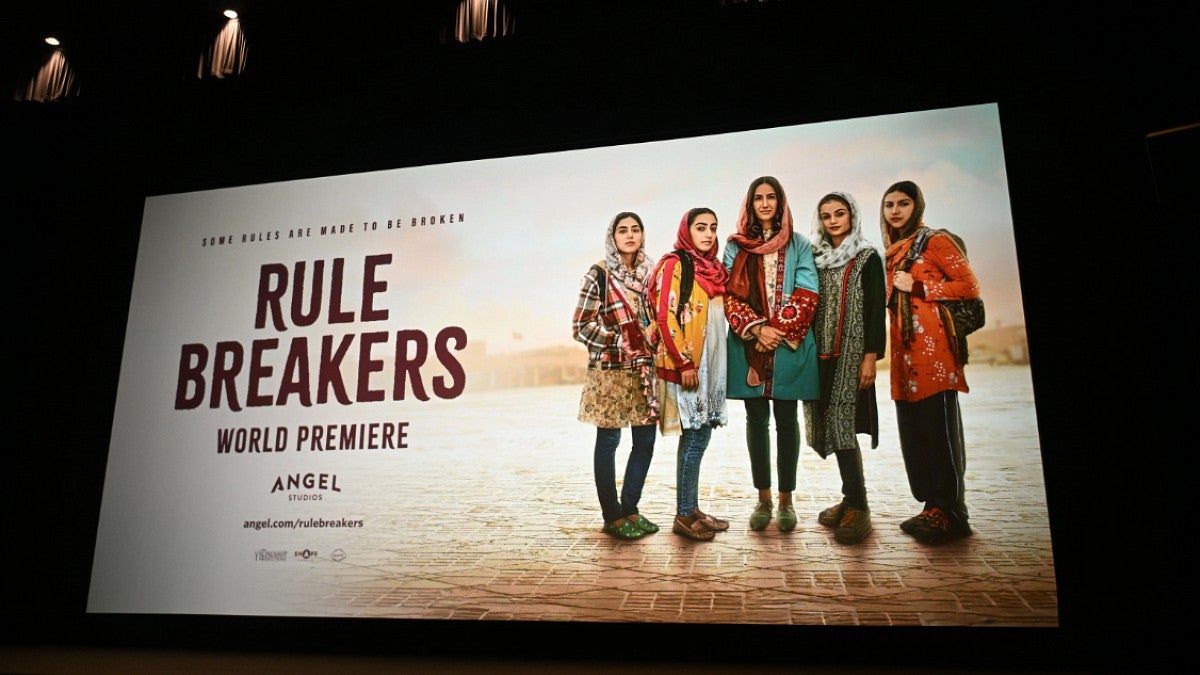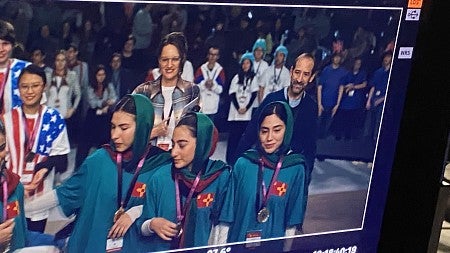
April 1, 2025 - 1:00pm
In 2017, an all-girls robotics team from Afghanistan captured international attention as they fought for a chance to compete on the world stage. Now their story is on the big screen, brought to life by Jason Brown, a creative writing professor in the College of Arts and Sciences.
The film, "Rule Breakers", was released in March in over 2,000 theaters across the country. Produced by Angel Studios, "Rule Breakers" is inspired by the real-life story of the Afghan Girls’ Robotics Team, also known as the Afghan Dreamers. Brown worked closely with Roya Mahboob, co-founder of the Afghan Dreamers, and her sister, Elaha Mahboob, to ensure the film remained true to the voices and experiences of its subjects. Elaha Mahboob co-wrote the film alongside Brown and Oscar-winning director Bill Guttentag.
Brown’s journey with "Rule Breakers" began back in 2014, when his sister, a human rights advocate working with UN Women, introduced him to R. Mahboob, Afghanistan’s first female tech entrepreneur. R. Mahboob had been using her success to fund computer classrooms for Afghan girls, providing them with a rare opportunity to gain digital literacy. Brown traveled to Afghanistan to document this, an experience that would later inspire the screenplay for Rule Breakers.
Although the documentary "The Afghan Dreamers" previously explored the girls’ story, Brown thought a feature film would bring their journey to life.
“I thought a major studio would have jumped on this story,” Brown said. “But it turned out there was a lot of hesitation — Hollywood wasn’t sure people would want to watch a film about Muslim teenagers in Afghanistan.”
However, he and Guttentag, an Academy Award-winning filmmaker, pushed forward, securing funding from philanthropist Laura Overdeck, who shares a passion for supporting women in STEM.
During an interview with the Oregon Humanities Center in 2015, Brown described this project as aligning with his broader interest in what he calls "humanitarian disruptors," individuals who make a difference outside of traditional non-governmental organizations and government structures. Brown noted that R. Mahboob exemplifies this concept through her determination to help her nation and people.
While fictionalized, the movie remains deeply rooted in the real struggles and triumphs of the Afghan Girls’ Robotics Team. The story demonstrates the team’s determination, including their fight for visas to attend international competitions. This effort made headlines when they were initially denied entry to the US under the Trump administration before a public outcry reversed the decision.
Recognizing his position as a white male filmmaker telling this story, Brown worked closely with the Mahboob family, ensuring that Afghan voices remained at the forefront of the film’s narrative.
“We wanted to avoid the common stereotypes of Afghans in the film. So often, they are either portrayed as Taliban fighters or victims. Instead, we wanted to showcase their joy, intelligence and courage,” he said.

This commitment to representation extended to the casting process, where the filmmakers prioritized actors from the region. The film also attracted major names, including "Fleabag’s" Phoebe Waller-Bridge, who was deeply moved by the script and eager to be part of the project.
Despite initial industry skepticism, "Rule Breakers" secured wide distribution, an achievement Brown credits to Overdeck’s belief in prioritizing the film’s message over profit.
“Her goal was to get this story out there, not to make money,” Brown said.
At its core, "Rule Breakers" is about the power of education and young people’s ability — regardless of nationality or gender — to change the world.
“When you see the film, you see kids from all over the world competing in these robotics tournaments. It’s a hopeful vision of international cooperation and problem-solving,” Brown said. “At a time when Afghanistan has once again fallen under Taliban control, this story is more important than ever.”
For Brown, the most rewarding part of the project has been working with the Mahboob family and the film’s cast to ensure that the story reflects the reality of Afghan women’s experiences.
“This wasn’t about imposing our vision,” he said. “It was about honoring theirs.”
Brown’s vision for "Rule Breakers" was reinforced by real-life figures like Saghar Salehi, a former member of the Afghan Dreamers. When the Taliban took power, she was forced to flee. Now a University of Oregon student on a full scholarship, she remains committed to expanding education for Afghan women. In an interview last year with UO’s College of Arts and Sciences, Salehi said, "Girls back home are now banned from education. My goal is to help them continue learning, even if the Taliban is banning them."
As Afghanistan faces ongoing challenges, a film like "Rule Breakers" is extremely relevant. The UO community will have the unique opportunity to see the film at a free screening on April 8, followed by a question-and-answer session with Jason Brown and director Bill Guttentag. This event offers a chance to engage with and learn from the filmmakers, all while witnessing an inspiring story of perseverance and education.
—By Harper Wells, College of Arts and Sciences
